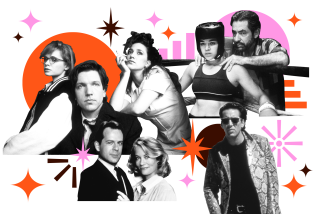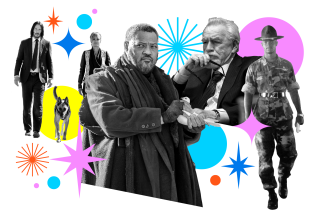Paying for Music on Demand
- Share via
Patrons at the 540 Club in San Francisco’s Richmond district remembered the late Johnny Cash this week by dropping money in the jukebox and filling the bar with his deep, gravelly voice.
The jukebox doesn’t hold any of the man in black’s 45s or CDs. But it does have a hard drive with room for 200 albums and a high-speed Internet connection. And that means it can download songs on demand from an online vault storing about 10,000 CDs worth of music.
The 540 Club is among more than 1,600 restaurants, bars and other venues with hard-drive equipped jukeboxes powered by Ecast Inc., a privately held Sunnyvale, Calif., company. Since late April, Ecast executives say, its music machines have played 13.2 million songs -- a third more than Apple Computer Inc. sold in the same period through its highly publicized iTunes Music Store.
Listeners have shown remarkably broad tastes, too, paying to play a range of songs from virtually every album in the vault instead of sticking to the hits.
There’s a lesson there for the music industry as it starts using the Internet to distribute tunes, said Ecast Chief Executive Robbie Vann-Adibe. If what the music industry is producing “is any good whatsoever,” he said, “there’s probably an audience for it, if you can give them a way to access it and pay for it.”
People may even pay a premium. Tracks from traditional jukeboxes run 50 cents or less apiece, while Ecast’s machines charge up to $2.50.
The Ecast effect on jukeboxes is a window on the music industry’s transformation in the online age. As more homes, businesses and public places gain “always on,” high-speed connections to the Internet, physical CDs and cassette tapes become less important than online collections that can be reached at any time, from any connected device.
So far, Ecast has reached only a fraction of the jukeboxes in America. It has just started to strike deals with jukebox operators overseas and has yet to turn a profit on its electronic distribution network, in which it has invested more than $30 million.
But Vann-Adibe said his company was the only one able to deliver music to jukebox users on demand through the Internet, and would be profitable next year. On Wednesday, Ecast announced its second exclusive deal with a jukebox manufacturer: Torrance-based Rock-Ola Manufacturing Corp. The announcement came two weeks after Ecast’s first manufacturing partner, Rowe International Inc., filed for Chapter 11 bankruptcy protection.
The 540 Club illustrates how the Internet can change a jukebox. Owner Jamie Brown said that because of the vast array of choices, people spend more time at the machine, so the task of picking songs becomes more social. And the huge menu leads to an unusually varied playlist.
For instance, Brown noted that only one set of Johnny Cash’s songs are stored on his jukebox’s hard drive. But rather than playing “I Walk the Line” over and over, Brown said, bar patrons selected a variety of songs from the 16 or 17 additional Cash albums on Ecast’s network.
Vann-Adibe said that over a typical three-month period, at least one song will be played from 98% of the CDs in Ecast’s library. And it’s usually much more than one song -- in fact, more than three-quarters of the entire library will be played, he said.
These statistics were stunning not just to Ecast but to executives at the record labels supplying the music, who expected that only 15% to 20% of the CDs would be tapped, Vann-Adibe said. “They were unaware that if you were to give people the choice, this is what people would do -- they’d go after 98% of the music.”
Another surprise is how much people are willing to pay to hear music on demand. Ecast-powered jukeboxes charge as much as $1 to download a track, and up to $2.50 to put a song next in line to be played. People are willing to pay extra to hear their picks immediately “a lot more often than you’d think,” Brown of the 540 Club said. When he reads the jukebox’s monthly reports, he said, “it shocks me.”
Despite the higher prices, Brown said, the jukebox’s wider selection prompts bar patrons to use it more than a conventional player. That means more revenue for the operator that supplies the jukebox, who splits the take with Ecast and the bar owner. Ecast, in turn, pays royalties to the record labels and music publishers.
Ecast’s licensing deals don’t give the labels nearly as much per song played, though, as the labels collect from tracks downloaded legally from the Internet. Label executives say that despite the lower volume, Apple’s iTunes Music Store generates significantly more royalties than Ecast.
Vann-Adibe would not disclose Ecast’s revenue.
Glenn Streeter, owner and chief executive of Rock-Ola, said his company “truly believes broadband is the future.” All the same, he said, it’s taken several years for the technology needed for a connected jukebox to become affordable and reliable.
Early versions of a networked jukebox appeared in the 1980s, but they were prohibitively expensive. “The equipment has now become more reasonable -- cheaper, smaller, faster,” Streeter said.Vann-Adibe, who got his start building Wall Street trading systems and transaction systems for the financial services industry, said creating a way to download music to jukeboxes without promoting piracy was no picnic.
In addition to developing a secure electronic network and storing more than 130,000 songs, Ecast designed the computer-like brains of the jukebox to be durable enough to survive in a bar.
The machine may be no more technically complex than the average PC, Vann-Adibe said, but it has several unusual requirements: It has to accept cash and credit cards, stop pirates from breaking into its hard drive and stand up to flying cue balls and spilling beer.
“What we’ve got is kind of a reverse ATM system. You put money in, make a selection and music comes out,” he said. “If music doesn’t come out after they’ve put their money in, people get really, really upset.”



